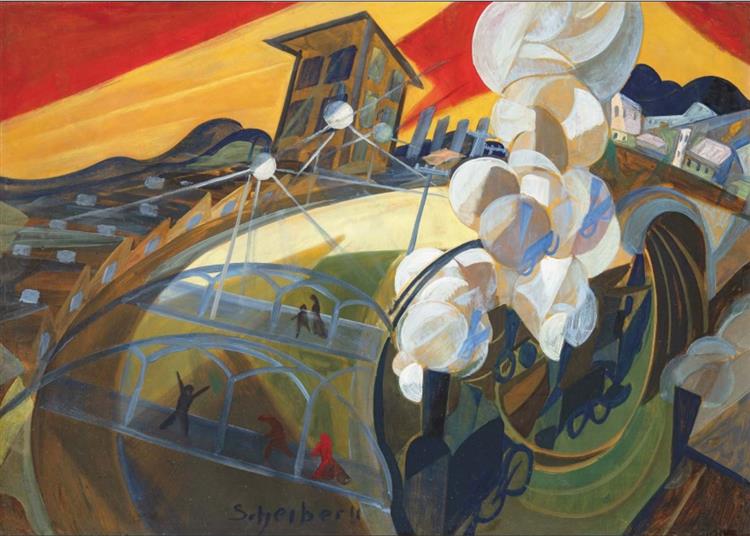Description
In the vibrant paint "1926 Olaj - Cardón - 71x101cm - 1926" by Hugó Scheiber, a visual universe is displayed that encapsulates the vertiginous energy of the modernity of the twentieth century. This work of art reflects the distinctive characteristics of Scheiber's style, which is established as a significant figure within constructivism and Hungarian futurism.
The first impact offered by the work is its bold color use. Dominated by a vibrant palette in which intense reds, bright yellow and deep blue stand out, the composition achieves a chromatic harmony that guides the viewer's gaze through a dynamic and almost orchestral route. The use of color is not arbitrary in Scheiber; Each tone seems to vibrate with an intensity that evokes the speed and innovation characteristic of the era that he lived.
The compositional structure of the work is equally remarkable. Scheiber organizes the elements in such a way that the painting acquires a sense of constant, almost kinetic movement. The geometric shapes are intertwined and overlap, creating a feeling of depth and rhythm reminiscent of the European artistic avant -garde of the early twentieth century. Diagonal elements and pronounced curves contribute to this sense of movement, perhaps suggesting the bustle of a modern city or the dynamism of industrial machinery.
Although we cannot identify realistic characters in the work, we can perceive silhouettes and forms that could be interpreted as stylized representations of human and architectural figures. These abstract forms invite the viewer to a free interpretation, to look for meanings beyond the simple visual object. This abstract and geometric approach is typical of constructivism, where the importance lies in the interrelation of shapes and colors rather than in a faithful representation of reality.
Hugó Scheiber was a prolific artist whose work is a testimony of a period of intense cultural and artistic activity in Europe. Scheiber was born in Budapest in 1873 and developed his career in a context of political and social agitation, which undoubtedly influenced his artistic approach. His contact with other avant -garde artists in Berlin and his participation in movements such as Der Sturm contributed to his adoption of a style that fuses elements of Italian futurism with the geometries of Cubism, creating his own visual language.
It is impossible to contemplate "1926 Olaj - Cardón - 71x101cm - 1926" without considering the historical context in which it was created. The 20s of the last century were a time of radical transformation, marked by technological innovations and deep social changes. Scheiber's work, with its dynamism and energy, reflects this new reality, where the past rural gives way to an industrial and urban modernity vibrant.
In conclusion, "1926 Olaj - cardboard - 71x101cm - 1926" by Hugó Scheiber is a work that encapsulates the essence of an era of modernization and change. With its bold color use and its dynamic composition, Scheiber invites us to a visual trip through the framework of forms and movements that define the artistic sensibility of the twentieth century. This painting is not only a delight for the senses, but also a testimony of the ingenuity and vision of its creator.
KUADROS ©, a famous paint on your wall.
Hand-made oil painting reproductions, with the quality of professional artists and the distinctive seal of KUADROS ©.
Art reproduction service with satisfaction guarantee. If you are not completely satisfied with the replica of your painting, we refund your money 100%.

